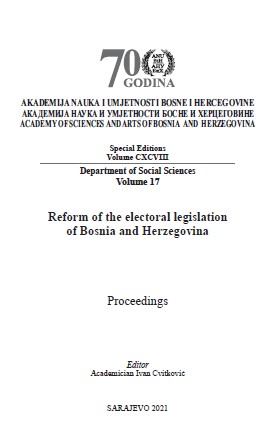Izborno zakonodavstvo u Bosni i Hercegovini u kontekstu prakse Evropskog suda za ljudska prava i Ustavnog suda Bosne i Hercegovine
Electoral Legislation in Bosnia and Herzegovina in the Context of the Case-Law of the European Court of Human Rights and the Constitutional Court of Bosnia And Herzegovina
Author(s): Miodrag N. Simović, Milena Simović
Subject(s): Constitutional Law, Human Rights and Humanitarian Law, Government/Political systems, Electoral systems, Transformation Period (1990 - 2010), Present Times (2010 - today), EU-Legislation
Published by: Akademija Nauka i Umjetnosti Bosne i Hercegovine
Keywords: elections; electoral system; suffrage; constitutional political right;
Summary/Abstract: The constitutional political right of citizens is to constitute authorities in political communities through elections. Election gives legitimacy to the legislative body as the broadest directly elected representation of citizens. By the act of election, citizens directly express their trust in the government they constitute. Elections are a way of gaining or losing legitimacy. The possibility of citizens’ participation in the election of government bodies is guaranteed by the right to vote, which presupposes the existence, above all, of a multi-party system, because in one-party system the citizens practically do not make an election, but vote in a plebiscite. However, the electoral system is part of the political system and, as a rule, shares its destiny. In doing so, an important aspect in observing the role and effect of the electoral system is the harmonization of the electoral system established by the constitution, laws and other regulations and the electoral system that actually functions in practice. This presupposes the existence of control (by bodies determined by the law) of compliance with all election principles and rules and the sanctioning of all violations that disrupt the electoral system and processes. The modern constitutional state is based on the sovereignty of the peoples and the rule of law, and the elections are the link between these two pillars of the modern state. Like any right, the right to vote can be violated, so the protection of that right is another important precondition for its realization. This issue has a broader constitutional significance, which comparative constitutional practice addresses in various ways.
Book: Reforma izbornog zakonodavstva Bosne i Hercegovine
- Page Range: 259-298
- Page Count: 40
- Publication Year: 2021
- Language: Bosnian, Croatian, Serbian
- Content File-PDF

